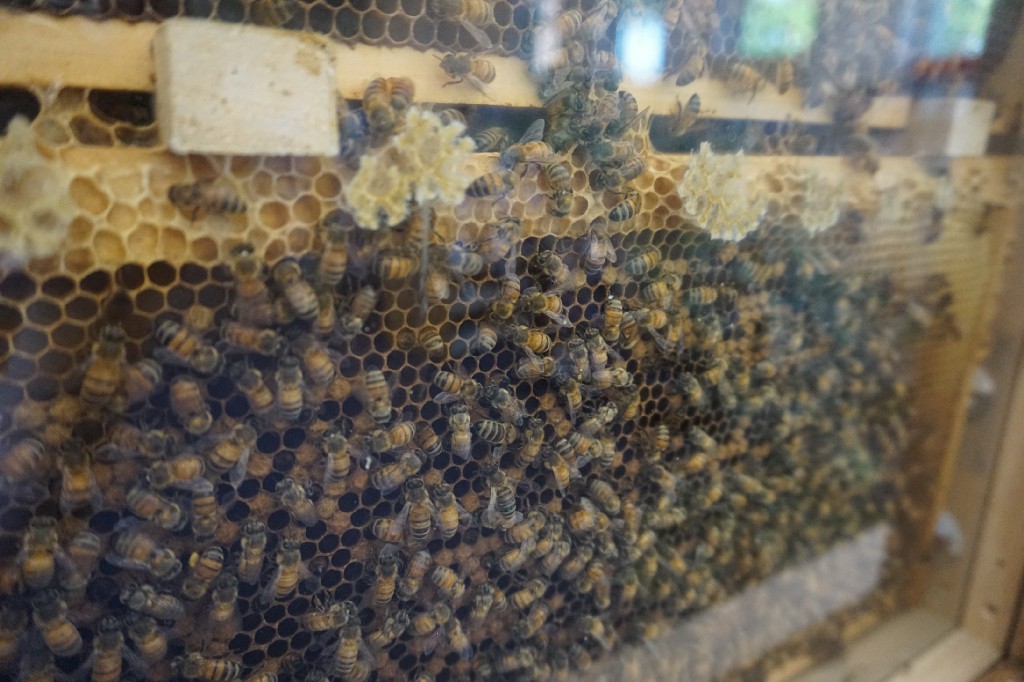Richmond Library now houses 10,000-plus honey bees in observatory hive

By Melissa Komar
While libraries are often perceived as quiet places, there’s quite a buzz at the Richmond Branch of the Free Library of Philadelphia.
On Thursday, June 7, a colony of approximately 10,000 honey bees, with one queen, arrived at the Port Richmond library, and was installed in an observation box fitted in a window to the far right of the entrance.
Although this is the first time library goers can view the insects from the interior of the building, honey bees have a long history at the library.
A feral honey bee hive called Richmond Library home for about a decade, according to library supervisor Amy Thatcher.
“The Richmond Library housed a large honey bee nest in the masonry. We had about 60,000 bees living in the library walls with many pounds of honey,” she said.
Located directly above the library’s entrance proved problematic — kids would throw rocks to irritate the hive and some patrons would be afraid to get close enough to the library to enter — and, so, Thatcher reached out to Don Shump, CEO of the Philadelphia Bee Company, to determine the best method for removing the hive.
Because honey bees are endangered and necessary to food production, traditional methods of extermination are prohibited, according to Thatcher.
“The only way to rid the branch of the bees was for Don to create a decoy hive to try and lure the bees out of the building’s masonry. Unfortunately, that did not prove to be successful, and as winter of 2017 approached, the bees became dormant,” Thatcher said. “Don told us nothing could be done until the spring of 2018, when the hive would likely reactivate. As it turns out, over time and through a harsh winter, the library bees died off. And, we sealed the outside of the masonry so that we wouldn’t have bees at the library entry above the doors.”
Although the initial problem had been solved, Thatcher and staff at the library were inspired by what they had learned about honey bees.
“That’s when I got the idea to house an observatory hive. I learned so much about bees and became so fascinated by their societies that I wanted to share what I learned,” she said.
Through pollination, bees assist in crop production from nuts, to fruits, to vegetables and “it’s estimated that bees are responsible for one in every three bites of food in the United States. That’s a crop value of $15 billion to $18 billion of food per year,” according to Thatcher.
“In an effort to promote understanding of the earth’s biodiversity and ecosystem, the Richmond Library is introducing honey bees to our community. Honey bee societies are models of the harmonious coexistence necessary to preserve our increasingly fragile environment,” she said.

Funding for the installation of the hive came from the Strategic Initiatives Office of the Free Library of Philadelphia and the care and maintenance of the hive will come from the library’s grassroots account, which comes from patron donations.
While the big draw might be seeing the bees up close, the library plans on incorporating its new residents into activities and fundraising.
Bee-themed storytimes were hosted the week of June 11.
Children librarian Meghan Dondero plans to have the Philadelphia Bee Company come to the library “to talk to children and families about honey bee societies and their importance to the environment.”
And, she hopes to start some nature-based programming “such as a pollinator garden and outdoor storytimes.”
“There are also some interesting connections between honey bees and math that I would like to explore. This is a great opportunity to bring together nature, STEM/STEAM, and literacy, and I hope it will spark some new interests in the kids,” she said.
Other bee-centric activities are in the works.
“I plan to host educational programs highlighting sustainability of our environment, explore cooperative societies, focus on female empowerment because 98 percent of honey bees are female), food production and science. The bees will serve as a basis for all of our programs,” Thatcher said.
Other ideas include working with Greensgrow — the hive originated on the urban farm — to provide samples of raw honey and partnering with Philadelphia restaurateurs to show patrons how to cook with honey.
While the programs will be a sweet bonus to the visible hive, the bottom line is educating all those who visit the library.
“We hope that our hive of 10,000 honey bees will deepen public awareness of environmental issues for patrons of all ages,” Thatcher said.
For updates on bee programming at the Richmond Library, call 215–685–9992 or visit the Free Library of Philadelphia — Richmond Branch Facebook page.
